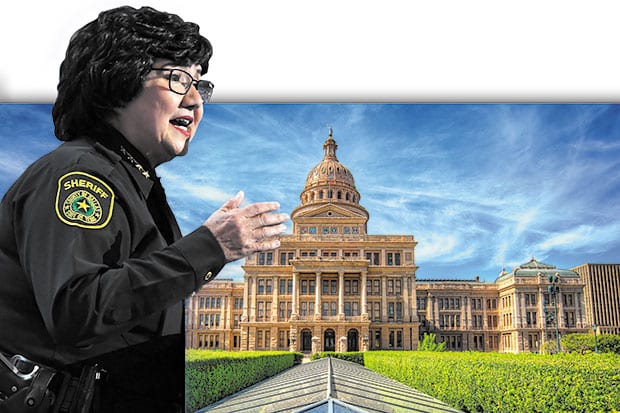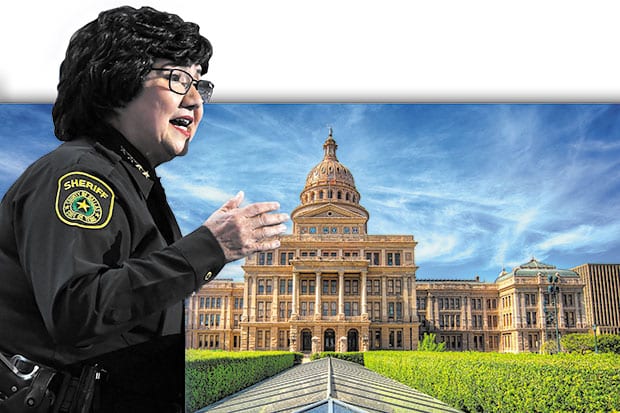The Texas Legislature considers allowing the religious ‘right’ to discriminate and whether to limit a city’s ability to write ordinances

Dallas Sheriff Lupe Valdez
DAVID TAFFET | Senior Staff Writer
Equality Texas categorizes anti-LGBT legislation currently being debated in Austin into four categories — religious exemptions, bathrooms, local control pre-emption and specific exemptions.
Bathroom bills have gotten the most attention during this session of the legislature. SB6 easily passed the Senate, which Speaker of the House Joe Straus derided and then buried in an unreceptive committee.
But Republicans in the House of Representatives offered their own version, and Deanne Cuellar, spokeswoman for Equality Texas, said the House version may be even more insidious than the original bill, because it pretends to not discriminate against the trans community.
“There’s no metric for what is acceptable discrimination,” she said.
Those offering the bill point to removing any mention of birth certificates and gender identity as improvements to the Senate version.
But that might allow the bill to actually discriminate against even more people.
The House version also includes local control pre-emptions that would invalidate nondiscrimination ordinances such as the ones in place in Dallas, Fort Worth and Plano.
Cuellar worried that even if the bill is not voted out of committee, the measure’s provisions could be tacked onto other bills as amendments, and said she and the staff, field team, fellows and interns working with Equality Texas won’t rest until the session is over.
For months, Gov. Greg Abbott stayed silent on Texas’ bathroom bill. Now Abbott’s all-in, making the prospects for Texas blocking its own cities and school districts from instituting transgender-friendly policies on public restrooms suddenly bright — even with barely five weeks left before the legislative session ends May 29.
Abbott promised to cooperate with state lawmakers to “get a bill to my desk that I will sign into law.”
Local control
Equality Texas is also worried about other bills that would restrict a city’s ability to protect its own citizens. Cities like Dallas have extended protection to all citizens based on gender identity and sexual orientation. Austin protects students from housing discrimination, an issue important to that city, but not to the other cities or the state in general. Grand Prairie, Mesquite, Arlington and others protect their LGBT city employees from employment discrimination.
Under the “home-rule charter city” provision of the Texas Constitution passed in 1909, Texas gave cities with a population of more than 5,000 broad discretion in making local laws. Restrictions proposed by the current legislature could inadvertently restrict everything from a city’s ability to set local speed limits to eliminating these nondiscrimination ordinances.
RFRA
Religious Freedom Restoration Act or RFRA laws would remove the requirement to prove “substantial burden” and allow anyone to claim religious reasons as the right to discriminate against LGBT people.
For example, a florist would have to prove that selling flowers to a same-sex couple would be a substantial burden to his business. Since selling flowers is what a florist does, selling flowers to any particular couple isn’t a substantial burden.
Under the proposed RFRAs — and Cuellar said a number of RFRA bills have been proposed — the florist wouldn’t have to prove any particular burden. They could just claim selling flowers to same-sex couples is against their religion.
Equality Texas points out that this argument was used in the 1960s by people who wanted to ignore the Civil Rights Act.
Sanctuary cities
This week, the Senate held hearings on SB4, the sanctuary cities bill, a solution to a problem that doesn’t exist because Texas has no sanctuary cities.
The measure compels state and local police to help enforce federal immigration law. It even allows for criminal charges against sheriffs and city or county officials who intentionally refuse to comply with attempts to deport people in the country illegally who already have been jailed on crimes unrelated to immigration.
The Senate already approved the bill, which has been bitterly opposed by immigrant rights groups, civil liberties organizations and top Texas sheriffs.
The bill’s author, Sen. Charles Perry, R-Lubbock, accused local sheriff departments in major cities of “perpetuating instability.”
In an Op-Ed piece in the Austin American-Statesman, Sheriff Lupe Valdez, along with sheriffs from Travis, Harris, Bexar and El Paso counties, argued that his bill would cause instability by preventing sheriffs from doing their jobs.
“Immigrants who are here are significantly less likely to commit crimes,” Valdez and the other sheriffs wrote.
The sheriffs argue that crime victims and witnesses should feel safe reporting crime to police and sheriff departments.
“We cannot drive crime victims and witnesses into the shadows without undermining local public safety,” they argued.
The FBI found that sanctuary cities actually have lower crime rates for all crimes including homicide. So solving the “problem” of sanctuary cities, like bathroom bills protecting people from attack by transgender people, something that’s never happened, is a solution in search a problem.
Just before Dallas Voice’s press deadline on Thursday, April 27, the Texas House tentatively approved its version of the sanctuary cities bill, including a provision that allows local peace officers to question the immigration status of people they legally detain.
Will Weissert with Associated Press contributed to this story.
This article appeared in the Dallas Voice print edition April 28, 2017.

